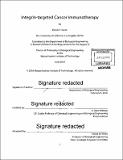Integrin-targeted cancer immunotherapy
Author(s)
Kwan, Byron H. (Byron Hua)
DownloadFull printable version (23.61Mb)
Other Contributors
Massachusetts Institute of Technology. Department of Biological Engineering.
Advisor
K. Dane Wittrup.
Terms of use
Metadata
Show full item recordAbstract
Integrins are a family of heterodimeric cell surface receptors that are functionally important for cell adhesion, migration and proliferation. Certain integrins, especially those that are known to recognize the arginine-glycine-aspartate (RGD) motif, are heavily overexpressed in many cancers relative to healthy tissue, making them attractive targets for therapeutic intervention. However, prior attempts to antagonize these integrins as a cancer therapy have all failed in the clinic. In this thesis, we instead exploit integrins as a target tumor antigen in the context of immunotherapy. The engineered cysteine knot peptide, 2.5F, is highly crossreactive and capable of recognizing multiple RGD-binding integrins. Our initial attempts to utilize this binder as a targeting moiety for delivering IL-2 as an immunocytokine failed. Mathematical modeling results indicated that immunocytokines, unless adhering to specific design criteria, are unlikely to benefit from targeting and may actually exhibit limited efficacy. Therefore, we "deconstructed" this immunocytokine into its functional parts: extended half-life IL-2 and 2.5F-Fc, the antibody-like construct directed against RGD-binding integrins. This combination immunotherapeutic approach was able to synergistically control tumor growth in three syngeneic murine models of cancer, including durable cures and development of immunological memory. Contrary to prior attempts at integrin-targeting, the mechanism of action was independent of functional integrin antagonism, including effects on angiogenesis and tumor proliferation. In fact, efficacy of this therapy depended solely upon the adaptive and innate arms of immunity, specifically CD8+ T cells, macrophages, and dendritic cells. Furthermore, checkpoint blockade, the gold standard for immunotherapy to date, can further enhance the efficacy of this therapeutic approach. This signifies that the combination of IL-2 and 2.5F-Fc exerts a distinct, yet complementary immune response that opens the door for clinical translation.
Description
Thesis: Ph. D., Massachusetts Institute of Technology, Department of Biological Engineering, 2016. Cataloged from PDF version of thesis. Includes bibliographical references.
Date issued
2016Department
Massachusetts Institute of Technology. Department of Biological EngineeringPublisher
Massachusetts Institute of Technology
Keywords
Biological Engineering.